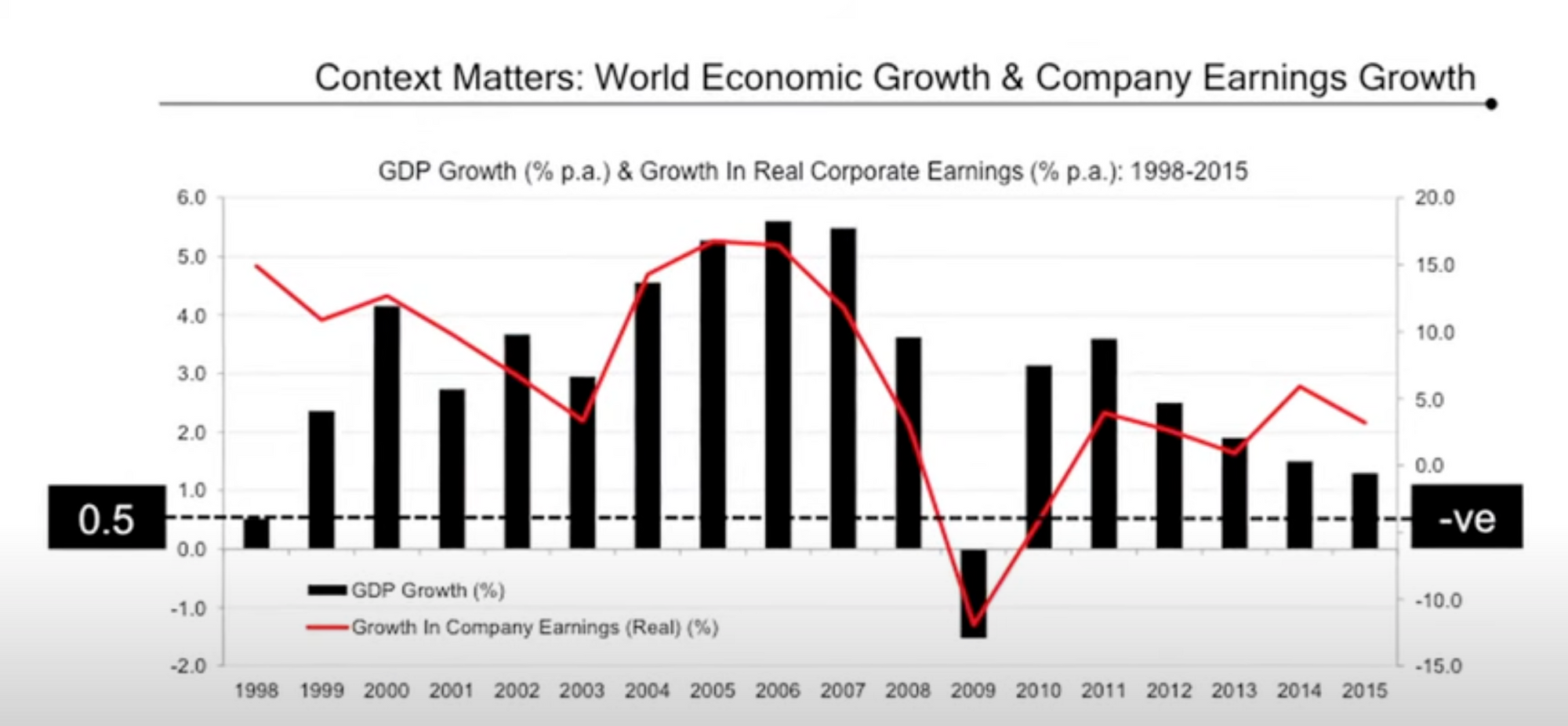What makes a business successful over the long-term?
Why do so few companies actually grow their earnings over time?
In order to be a success over the long-term, a company needs to consistently be able to create and sell things for more money than what it takes to create those things.
In other words, put simply a company's earnings need to consistently increase annually.
According to Dr Adrian Saville at the GIBS Business School, when researchers looked at the earnings graphs of listed NYSE companies over a period of time in comparison to levels of general economic growth over the same period, a startling correlation can be seen in the performance of both.

Company earnings closely follow what was happening in the overall economy.
When the economy was flourishing, company earnings also flourish. When the economy turns and hard times hit; so to do the earnings.
As the saying goes: 'A rising tide lifts all ships.'
At this point you might be tempted to think that a company's success has nothing to do with how it is managed, or what industry it's in, but rather is purely determined by how well an economy is performing over time.
It's a tempting cop out, but it's not always true.
In an effort to understand why not all companies are affected in the same way, when it comes to this worrying statistical correlation, a number of researchers and growth experts have been searching for outliers (companies that buck the trend) and trying to understand what makes them so different from everyone else.
Of the 5000-listed companies surveyed by Prof Rita McGrath of Columbia University Business School a few years ago, just 10 companies, from various global locations and industries consistently managed to grow their turnover and income year-in and year-out, despite what was going on in the contextual economy.
Just 10 companies out of 5000 of the biggest and most well-known brand name in the world.
What did those 10 outlier companies all have in common?
Two key attributes were found in all 10 of them - (1) the capability to quickly chase identified market opportunities when the time was right to do so, and (2) they were structurally designed to weather poor contextual economic conditions whenever they occurred.
1. Agility means their nimbleness with regard to operations, portfolios and strategy.
• Operational agility is the ability to take advantage of opportunities to improve operations;
• Portfolio agility is reflected in companies which are able to adapt their underlying holdings in line with a changing environment. Good local examples of this would be Imperial, Bidvest and Barloworld;
• Strategic agility occurs where leaders have vision and courage to follow new paths and where mistakes are corrected swiftly, before they become entrenched.
2. Absorption means that a company can withstand the vagaries of a challenging environment – that it has “shock absorbers” in place to cushion it during turbulent or trying times. A sound balance sheet with modest debt levels, a diversified (and strong) cash flow and loyal customers are examples of traits which an absorptive company displays. Other examples would be constant innovation, taking many small bets and listening to what clients want. - via
So these are companies that recognise that there are good economic times and tough economic times. They are able to speed up, and slow down, as and whenever needed. They possess a library of innovations, which are kept in active development until the perfect time presents itself to actively market those new concepts. They're strategic in their operational approach, not over-extending themselves when conditions are not right to do so. These are companies that are happy to grow, as well as contract - acknowledging that economic seasons are transient and the smartest of them work with the natural ebb and flow of those changes, not against them.
These are companies that read the prevailing conditions well as they go along and have a future plan of action for new value that will yield new earnings when the right timing presents itself.
Organisational agility and the ability to absorb less than favourable contextual conditions (according to Dr. Saville) are attributes that are available to every business, yet clearly very few recognise their agency to structure themselves in this way.
The reason for this has a lot to do with how business managers define success and what they value. The mindset that is prevalent within an organisation determines that organisation's behaviour. Recognising that there is a time to go fast and a time to go slow is not the kind of wisdom that you often hear coming from the mouths of most company leadership.
Work then on the collective mindset of an organisation and you begin to unlock a company's ability to be truly sustainable over time.

